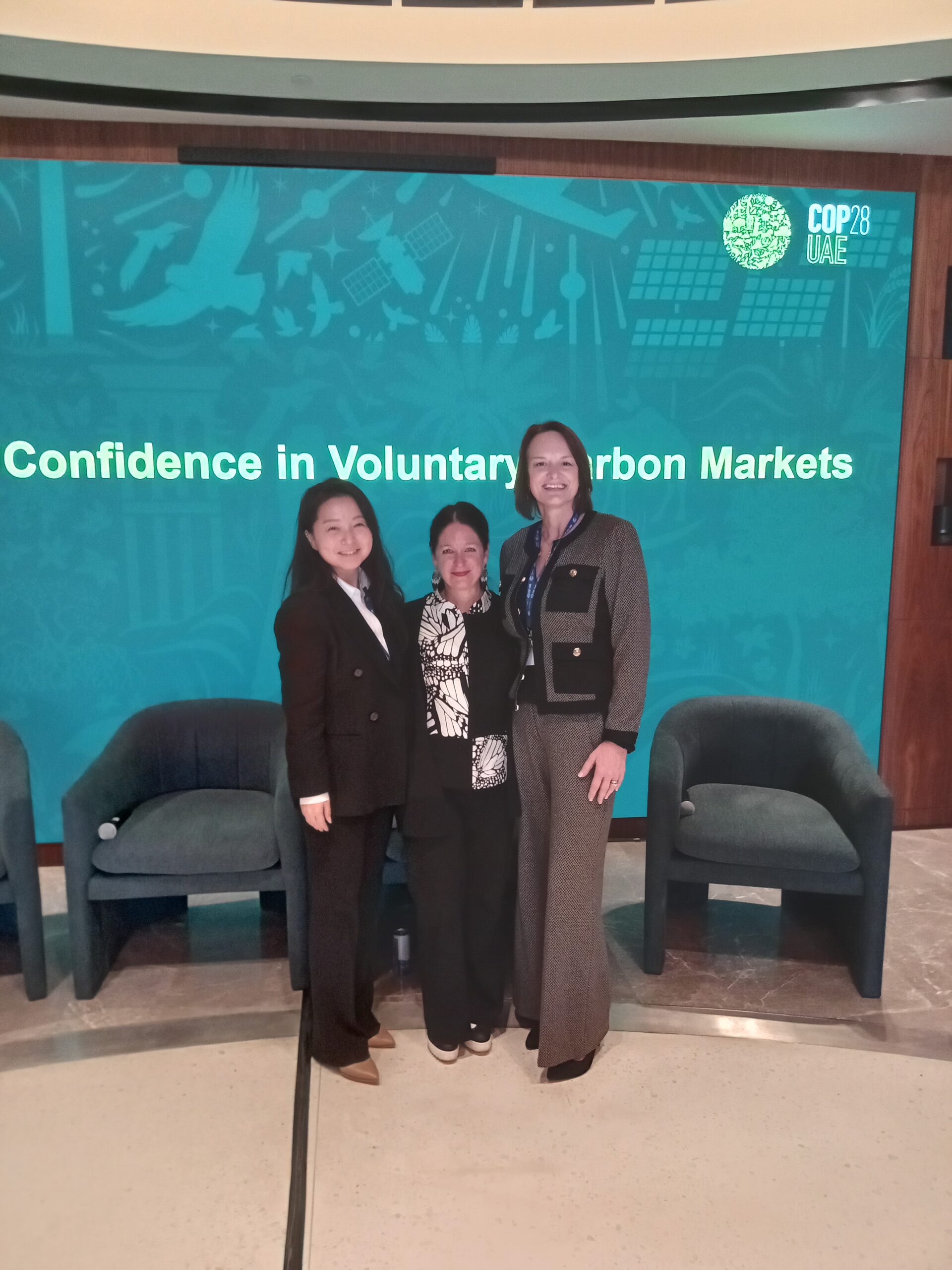This website uses cookies so that we can provide you with the best user experience possible. Cookie information is stored in your browser and performs functions such as recognising you when you return to our website and helping our team to understand which sections of the website you find most interesting and useful.
Momentum for VCM at COP28

Image: ACR's Mary Grady (Center) with Judith Simon (Verra) and Margaret Kim (Gold Standard)
While much of the focus was on the historic agreement calling for “transitioning away from fossil fuels in energy systems, in a just, orderly and equitable manner,” the climate summit also witnessed many important commitments related to carbon markets generally, and voluntary carbon markets in particular.
No new agreement on Article 6
First, the elephant in the room: There was no agreement on Article 6 implementation at COP28, as administrative procedures for Article 6.2 transfers and expert recommendations for Article 6.4 operationalization fell victim to political theater disguised as concerns about integrity. Nonetheless, as IETA notes, “countries can and should implement international carbon markets under Article 6.2,” since the guidance to operationalize it was agreed upon by Parties to COP26. In fact, Article 6.2 cooperation agreements that have been announced to date are moving forward.
As for Article 6.4, which is the new centralized crediting mechanism administered by the UNFCCC, the lack of agreement delays implementation by at least a year and only serves to further heighten the importance of work happening in global carbon markets. With 2030 deadlines approaching and no 6.4 mechanism in place, the importance of the role of internationally recognized independent crediting programs, like ACR, to support countries’ NDC achievement further increases. Independent crediting programs can serve as a foundation for domestic carbon markets, Paris Agreement cooperation and to support voluntary corporate climate action. As Amy Merrill, COO of ICVCM, said, “we must collectively push on with our work to ensure that there are clear signals and consistent international rules that enable carbon markets to play their role in helping to keep 1.5 alive, in delivering finance to where it is needed most.”
During COP28, Mary Grady participated in a panel on “Carbon Markets 2.0 – What Does the Future Hold?” on the Singapore Pavilion with Anshari Rahman of GenZero, Olga Gassan-zade, co-chair of the Article 6.4 Supervisory Body, Duncan van Bergen of Calyx Global, and Robin Rix of Verra. In particular, the discussion highlighted the need for multiple high-quality crediting standards, even once Article 6.4 is operational. Watch the panel discussion here.
ACR joins with crediting programs to promote scale and integrity
ACR, with the Architecture for REDD+ Transactions (ART), Climate Action Reserve, Global Carbon Council, Gold Standard, and Verra “joined forces to amplify the impact of carbon markets in mitigating climate change,” which was announced at COP28. Notable as the first time the organizations joined together to explicitly endorse a common direction, the statement set a tone of collaboration and momentum for the VCM.
Strong Signals of Support for Carbon Markets as an Essential Climate Solution
Despite the lack of Article 6 progress in the formal negotiations, the tone of collaboration and momentum was echoed elsewhere at COP28 by increasingly united voices that highlighted the critical role high-integrity carbon markets can and must play in delivering urgent action, mobilizing much-needed climate finance and supporting efforts to protect and restore nature. During a roundtable organized by the COP Presidency, World Bank President Ajay Banga, US Special Climate Envoy John Kerry, and UN Climate Change Executive Secretary Simon Stiell all spoke in support of the market.
Many voices from the Global South were also raised in support of carbon markets as an important mechanism for mobilizing finance, including the 15 governments that united in launching a roadmap to scale investment in forest carbon results and credits. As Samuel A. Jinapor, Ghana’s minister for lands and natural resources, Vickram Bharrat, Guyana’s minister of natural resources wrote, and Graham Stuart, the United Kingdom’s minister for energy and net zero wrote, “A properly functioning forest carbon market could help unlock billions in urgently needed funds to protect and restore forests and enable the communities that look after them to follow sustainable pathways to development.”
Supportive statements were also issued by some of the leading philanthropies, NGOs and regulators. Taken together, following a year filled with discord, these voices struck a fresh sense of harmony for the year ahead.
Energy Transition Accelerator rolls out
The U.S. Department of State, Bezos Earth Fund, and The Rockefeller Foundation presented the core framework for the Energy Transition Accelerator, an innovative carbon finance platform to catalyze private capital and support an ambitious just energy transition in developing and emerging economies. In parallel, the team at Environmental Resources Trust (ERT) released key elements of the independent sectoral-scale carbon crediting standard for use by ETA. ERT, the wholly owned nonprofit subsidiary of Winrock International that also operates ACR and the Architecture for REDD+ Transactions (ART), was represented by Mary Grady at the launch event.
Renewed Focus on the Role of Forests and REDD+
COP28 also saw new focus on the role of forests and REDD+ as climate solutions. Former UK Prime Minister Tony Blair and President Irfaan Ali of Guyana spoke in support of selling carbon credits from conserving Guyana’s forests, two new jurisdictions – Burkina Faso and Mato Grosso, Brazil – published TREES concepts on the ART registry (which now has 20 jurisdictions in progress) and the LEAF coalition signed Emissions Reductions Purchase Agreements (ERPAs) with Ghana and Costa Rica, in a sign of demand from companies and governments.
Additional COP28 resources
Alexia Kelly, Managing Director, Carbon Policy and Markets Initiative at the High Tide Foundation, has an excellent summary of announcements from the first week of COP28. As she noted, “capital markets are waking up, and there seems to be broad consensus that delivery of the Paris Agreement Goals will be harder and more expensive without access to high integrity emissions trading markets.”
In addition, IETA has a COP28 Hub full of announcements and daily summaries of the event. For in-depth analysis of Article 6 debates and other COP28 news, check it out.




